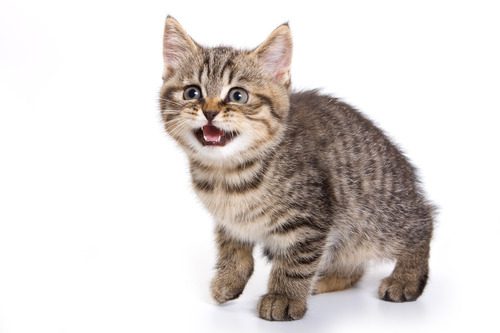Why Is My Cat Meowing So Much?
You’re used to your cat meowing now and then, but lately it feels like they have something urgent to say—over and over again. Whether they’re pacing the hallway at night or vocalizing the moment you walk through the door, constant meowing can leave you wondering what’s going on. Are they hungry? Stressed? Trying to tell you something more serious? If you’ve been asking yourself, “Why is my cat meowing so much?” you’re right to be curious. In this blog, we’ll explore the many potential reasons cats become more vocal and help you recognize when it’s time to seek professional care. If you’re concerned about your cat’s behavior, call The Village Vets – 24 Hour Emergency in Atlanta, GA anytime at (404) 371-9774.

What’s Considered “Normal” Meowing?
Cats vary widely in how much they vocalize. Some breeds, like Siamese and Bengals, are naturally more talkative, while others are more reserved. It’s also important to consider your cat’s individual personality. A sudden increase in vocalization—especially if your cat is usually quiet—can indicate something has changed.
Everyday Communication
While some meowing is normal and part of daily communication, a notable shift in frequency, volume, or tone could signal that your cat is trying to get your attention for a reason.
Context Matters
Cats may meow to greet you, ask for food, seek attention, or alert you to discomfort. Paying attention to the context of the meowing, as well as any changes in behavior or routine, can help you better understand the cause.
Noticing Behavior Changes
If the question “Why is my cat meowing so much” keeps coming up in your home, a closer look at their daily habits may provide some clues.
Potential Behavioral Reasons for Increased Meowing
Some of the most frequent causes of increased vocalization are behavioral. These are usually harmless but may require some changes in your cat’s environment or routine to resolve.
Hunger or Feeding Schedules
Cats are creatures of habit and may meow when it’s close to mealtime—or even if they think it’s mealtime. A cat that is consistently fed at the same time each day may begin vocalizing in anticipation. If your cat is meowing persistently near their food bowl, this may be the explanation.
Attention-Seeking Behavior
If your cat feels ignored, they may try to get your attention by meowing. This often happens when a cat is left alone for longer periods than usual or when their human is distracted. Cats that enjoy interaction and play will vocalize more when they’re looking for companionship or stimulation.
Boredom or Lack of Stimulation
Indoor cats, especially those without regular enrichment, can become bored. Meowing can be a way for them to release pent-up energy or express frustration. Providing more playtime, toys, and interaction can reduce this type of vocalization.
Stress or Environmental Changes
Changes in your home—such as moving, introducing a new pet, or having visitors—can stress a cat. Cats thrive on routine, and even small disruptions can lead to behavioral changes like excessive meowing. If you recently made changes at home and your cat started vocalizing more, this may be a factor.
Medical Reasons Behind Excessive Meowing
When behavior changes suddenly or becomes persistent, it’s important to rule out medical causes. Cats often meow to express discomfort or confusion, especially when they’re unable to articulate the problem in other ways.
Hyperthyroidism
One of the most common medical reasons cats start vocalizing more frequently is hyperthyroidism. This condition, often seen in older cats, can cause increased hunger, restlessness, and excessive meowing—especially at night.
Cognitive Dysfunction in Senior Cats
If your older cat is suddenly vocalizing more, especially during the night, cognitive dysfunction (similar to dementia in humans) could be the cause. These cats may become disoriented and meow as a response to confusion or anxiety.
Pain or Discomfort
Cats in pain may become more vocal, especially if the discomfort is chronic or intermittent. Issues like arthritis, dental problems, or internal discomfort can all cause a cat to meow more than usual.
Vision or Hearing Loss
Sensory decline can lead to confusion or distress, particularly at night. A cat that can’t see or hear as well may vocalize to seek reassurance or to help orient themselves in their surroundings. If your cat is vocalizing more and shows other changes—such as weight loss, increased thirst, or changes in grooming habits—call The Village Vets – 24 Hour Emergency at (404) 371-9774 to have your cat evaluated by our experienced team.
Nighttime Meowing and What It Might Mean
Nighttime vocalization can be especially frustrating for cat owners. A peaceful evening quickly turns into hours of meowing, pacing, or yowling. Understanding the cause can help you respond appropriately.
Increased Energy in Younger Cats
Young cats and kittens often have bursts of energy in the evening. Without sufficient stimulation during the day, they may choose nighttime hours to run, play, and—yes—meow. Offering play sessions before bed can help redirect this energy.
Age-Related Anxiety
Senior cats that meow more at night may be experiencing age-related confusion or anxiety. This may worsen in the dark when they feel less secure. Nightlights, familiar scents, or calming routines can sometimes reduce their distress.
Hunger or Empty Food Bowl
Cats will often vocalize at night if they’re hungry or if they notice an empty bowl. Offering a small, protein-rich snack before bedtime may help reduce their desire to wake you up for food.
Is It Necessary to Call the Vet About Excessive Meowing?
While some meowing is normal, there are situations where veterinary care is important. If your cat’s vocalizations come with other symptoms—such as changes in appetite, grooming, litter box habits, or energy levels—it’s best to have them checked out. You should also call your vet if:
- The meowing starts suddenly and persists
- It sounds distressed or painful
- Your cat is elderly and showing signs of disorientation
- Your cat is vocalizing in a way that’s out of character
The Village Vets – 24 Hour Emergency in Atlanta is available around the clock to evaluate and care for cats exhibiting sudden behavioral changes. If you’re wondering “Why is my cat meowing so much?” and you’re not sure what to do next, our team is here to support you.
Helping Your Cat Feel Heard and Understood
Responding to your cat’s meowing with awareness and compassion is key to resolving the behavior—or understanding when to seek help. Whether your cat is asking for food, stimulation, comfort, or is signaling a health issue, their vocalizations are a form of communication that deserves attention. You know your cat better than anyone, and noticing a change in how much they meow is worth exploring. Understanding the many reasons behind the question, “Why is my cat meowing so much?” gives you the tools to support their needs and respond with confidence. When the meowing becomes excessive or concerning, The Village Vets – 24 Hour Emergency is just a phone call away. Reach us anytime at (404) 371-9774.

